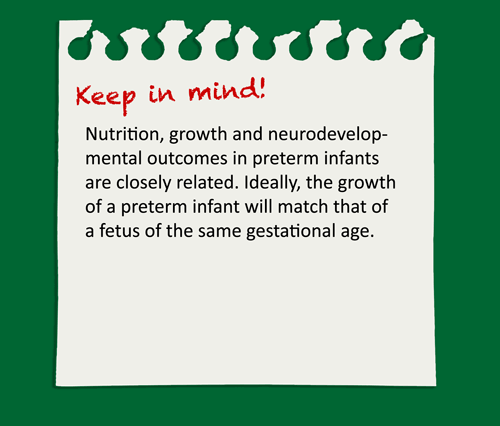Lesson 2: Benefits of Optimal Preterm Nutrition in the Neonatal Intensive Care Unit (NICU)
2.3 Growth and Nutrition in the NICU
Growth faltering is a problem and early nutrition is the key to preventing it. Though large, randomized controlled trials to prove causality are lacking, numerous studies have demonstrated positive and often statistically significant associations between nutrition and growth, growth and neurodevelopmental outcomes, and nutrition and neurodevelopmental outcomes (Ehrenkranz 2014). (Please see Lesson 2.4 for a discussion of nutrition and brain development.)
Studies of nutrition and growth have generally shown better nutrition to be associated with better in-hospital growth. Better nutrition delivery includes: higher protein intakes, and earlier initiation of lipids, protein and enteral feeds (Ehrenkranz 2014). The beneficial effects of both optimized early nutrition and resultant growth are measurable well after discharge from the hospital:
higher amino acid intakes in the first week of life have been found to have a significant correlation with better growth (and neurodevelopmental outcomes) at 18 months' corrected age (Stephens et al. 2009);
higher energy intakes during hospitalization have been associated with better long-term growth (fat-free mass gains to 4 months corrected age) (Ramel et al. 2011). And better linear growth correlates with better neurological outcomes at 24 months corrected age (Ramel et al. 2012)
in preterm infants higher postpartum weight gain and linear growth was correlated to better neurodevelopment outcomes (Belfort et al. 2011)
higher weight gain in the neonatal intensive care unit (similar to in utero weigh gain) has been shown to correlate significantly with decreased clinical morbidity, decreased incidence of cerebral palsy, and improved scores on neurodevelopmental assessments at 18-22 months' corrected GA (Ehrenkranz et al. 2006).
Figure 7: Higher growth velocity predicts a better neurological outcome.
In 490 ELBW infants, higher growth velocity on the neonatal intensive care unit similar to intrauterine
growth rates predicts a better neurological outcome at 18-22 months' corrected age
Source: Uauy & Koletzko 2014; reprinted with kind permission of S. Karger AG, Switzerland
Though important for many aspects of development, weight gain in preterm infants may not always be desirable if too rapid at certain sensitive periods. Indeed, depending on the nutrients being provided, rapid weight gain may reflect disproportionate fat rather than lean body mass accretion. Preterm birth has been found to be associated with reduced insulin sensitivity in childhood and also later in life. Further research is needed to determine how best to optimize nutritional care to improve long-term outcomes without increasing the risk of longer-term metabolic disturbances (Tinnion et al. 2014).
The current recommended intake of protein and energy to allow for optimal growth of the preterm infant is covered in Unit 2 of this Module.

